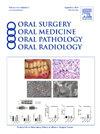抗骨质吸收疗法与放射治疗相结合会增加坏死和相关并发症的风险
IF 2
3区 医学
Q2 DENTISTRY, ORAL SURGERY & MEDICINE
Oral Surgery Oral Medicine Oral Pathology Oral Radiology
Pub Date : 2025-01-01
DOI:10.1016/j.oooo.2024.07.008
引用次数: 0
摘要
头颈部接受抗骨质吸收药物和放射治疗的患者在治疗过程中发生颌骨坏死的情况极为罕见。因此,本研究旨在确定这一极易受伤害的患者群体的治疗结果和并发症。本研究选取了头颈部同时接受抗骨质吸收治疗和放射治疗的17名患者(药物相关性颌骨坏死/骨坏死=[MRONJ/ORN]组)。所纳入的患者均在 2005 年至 2022 年期间在我科接受过治疗。424 名 MRONJ 患者(MRONJ 组)和 138 名颌骨 ORN 患者作为两个对照组(ORN 组)。研究人员记录了患者的人口统计学数据、病变定位、初诊日期、临床症状、治疗类型(手术或非手术)、抗骨吸收治疗的详细情况、疗效和并发症。与只接受其中一种治疗的患者相比,头颈部接受抗骨质吸收治疗和放疗联合治疗的患者更容易出现病理性骨折、连续性切除和复发。考虑到复发、骨折和连续性切除,MRONJ/ORN组与MRONJ组、MRONJ/ORN组与ORN组之间的差异有统计学意义(< .001)。ORN 合并 MRONJ 患者的复发风险是 MRONJ 患者的 4 倍,是 ORN 患者的 1.5 倍。MRONJ/ORN患者更容易发生颌骨骨折和连续性切除。头颈部接受抗骨质吸收治疗和放射治疗的患者发生颌骨骨坏死并发症的风险较高。因此,强烈建议严格执行随访护理计划。本文章由计算机程序翻译,如有差异,请以英文原文为准。
Antiresorptive therapy in combination with radiation results in enhanced risk for necrosis and associated complicatifions
Objective
Patients exposed to a combination of antiresorptive medication and radiotherapy of the head and neck area developing necrosis of the jaw in the course of treatment are extremely rare. Therefore, the aim of this study was to identify the outcome and complications in this highly vulnerable patient cohort.
Study Design
Seventeen patients who received both antiresorptive treatment and radiotherapy (medication-related osteonecrosis of the jaw/osteoradionecrosis = the [MRONJ/ORN] group) in the head and neck area were enrolled in this study. Included patients were treated in our department between 2005 and 2022. Four hundred twenty-four patients with MRONJ (the MRONJ group) and 138 patients with ORN of the jaw were enrolled as two control groups (the ORN group). Demographic data, lesion localization, date of primary diagnosis, clinical symptoms, type of therapy (surgical or non-surgical), details on antiresorptive treatment, outcome, and complications were recorded.
Results
Pathological fractures, continuity resection, and recurrence appear more often in patients who receive a combination of antiresorptive treatment and radiotherapy in the head and neck area compared with patients undergoing only one of these treatments. There was a statistically significant difference (P < .001) between the MRONJ/ORN group and the MRONJ group and the MRONJ/ORN group and the ORN group considering recurrence, fracture, and continuity resection. Patients with ORN combined with MRONJ have a 4-times higher risk for developing recurrence compared with patients with MRONJ and a 1.5-times higher risk for recurrence compared with patients with ORN. Jaw fracture and continuity resection appear more often in patients with MRONJ/ORN.
Conclusions
Patients under antiresorptive therapy in combination with radiation therapy in the head and neck area have a higher risk for developing complications in case of osteonecrosis of the jaw. Therefore, a strict follow-up care schedule is highly recommended.
求助全文
通过发布文献求助,成功后即可免费获取论文全文。
去求助
来源期刊

Oral Surgery Oral Medicine Oral Pathology Oral Radiology
DENTISTRY, ORAL SURGERY & MEDICINE-
CiteScore
3.80
自引率
6.90%
发文量
1217
审稿时长
2-4 weeks
期刊介绍:
Oral Surgery, Oral Medicine, Oral Pathology and Oral Radiology is required reading for anyone in the fields of oral surgery, oral medicine, oral pathology, oral radiology or advanced general practice dentistry. It is the only major dental journal that provides a practical and complete overview of the medical and surgical techniques of dental practice in four areas. Topics covered include such current issues as dental implants, treatment of HIV-infected patients, and evaluation and treatment of TMJ disorders. The official publication for nine societies, the Journal is recommended for initial purchase in the Brandon Hill study, Selected List of Books and Journals for the Small Medical Library.
 求助内容:
求助内容: 应助结果提醒方式:
应助结果提醒方式:


